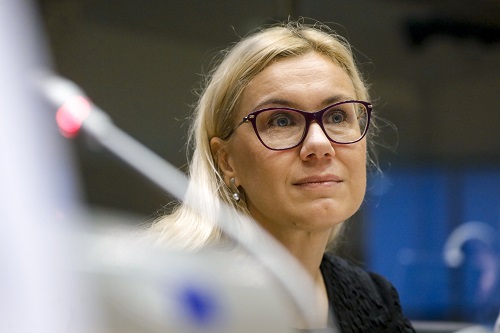
The 2020 report is the first one since we launched our new sustainability and growth strategy, the European Green Deal. A well-functioning Energy Union is the necessary basis to deliver our climate neutrality commitment by 2050.
Together with this report I have presented three key initiatives: the renovation wave, the methane strategy and Commission recommendations on energy poverty.
The initiatives of the energy package are important stepping stones to reach our 2030 Climate Target Plan. They will make sure that we seize the significant decarbonisation potential of buildings and address energy poverty in order to leave nobody behind in the clean energy transition.
National Energy and Climate Plans will also remain an important tool in achieving the minimum 55% reduction in greenhouse gases. Together with the State of the Energy Union, we also published a detailed assessment of the plans of each Member State. The final NECPs are complete, robust and ambitious. Our analysis shows that each Member State has still some homework to do, especially on energy efficiency. But overall, we are heading in the right direction. The plans demonstrate that Europe can meet ambitious climate targets.
The Commission will ensure clear and inclusive follow-up of those plans, including on the progress of implementation and on the need to revise the level of ambition of the NECPs to reflect a higher carbon emission reduction target for 2030.
The State of the Energy Union report provides an overview of progress of the Energy Union across all its dimensions. I would like to focus on 3 areas:
First, we know that delivering the higher climate ambition in the energy sector is a genuine investment challenge. The State of the Energy Union report maps out the funding opportunities offered by the recovery and resilience facility and other EU instruments. In particular, the Annual Sustainable Growth Survey identified three energy-related flagships: clean energy technologies, renovation and sustainable transport – where Member States can focus their national renovation plans. This shows that the NextGenerationEU offers an unprecedented opportunity to mobilise resources to promote the green and digital transformation of our economies and we should use it.The report, however, shows that national budgets devote a declining share to clean energy research and innovation. When we measure the volumes of research funding as a share of GDP, Europe has one of the lowest rates among major global economies. Private sector investment in Energy Union R&D priorities is also slowing down. I am very concerned by this trend.
Second, the report shows that the volume of energy subsidies, in particular for fossil fuels is still considerable. Fossil fuel subsidies amounted to 50 billion euros in the EU in 2018, one third of all our energy subsidies. The European Green Deal is clear: fossil fuel subsidies have to end. They remain a major impediment to a cost-efficient energy and climate transition, but also to a functioning internal market. Therefore, the Commission will reinforce its cooperation with Member States to phase out fossil fuel subsidies and reduce fossil fuel consumption. Energy subsidies should be targeted to boost the uptake of new energy technologies, to promote sustainable patterns of energy consumption, and to lower energy bills.
Third, this year’s State of the Energy Union included for the first time a report on the competitiveness of the clean energy industry in Europe. The findings are quite significant. The growth of the clean energy technologies sector has significantly outpaced that of the conventional energy sector. Clean energy technologies have created more jobs and added more to gross domestic product and labour productivity. This has been especially obvious in energy efficiency, where the number of jobs went up 17.4% between 2000 and 2017.The competitiveness report also shows that the EU industry holds a strong global position in some of the key technologies – namely offshore, solar energy, storage, batteries and hydrogen – technologies which have major scaling up potential over the coming years.
In the coming months, we will take these elements forward and we will focus our discussion with all relevant stakeholders on a”value chain-based” approach, to support the industries and innovators in the EU to maintain or achieve global success.

















